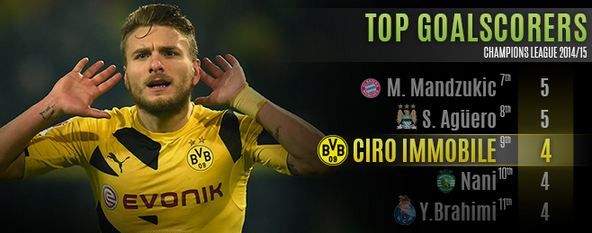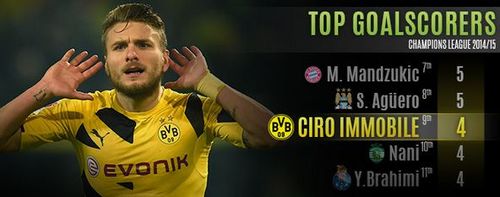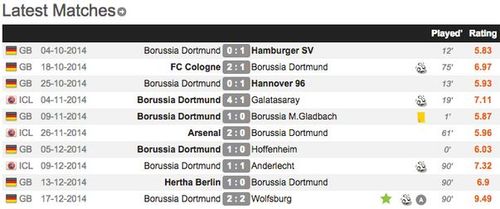
Decoding Ciro Immobile: How he shines in Europe for Borussia Dortmund

“I’d prefer not to,” Ciro Immobile told Tuttosport. He didn’t want Borussia Dortmund to draw Juventus in the last 16 of the Champions League. “Honestly, I’m hoping we meet later on,” he revealed, “perhaps in the semi-finals.” It would leave the striker conflicted. On the one hand, Immobile expressed his wish that Juventus “go as far as possible.”
He still feels grateful to them for their part in his development. “It would also be important for the wellbeing of Italian football,” he said. On the other, as a former Torino player “with the Toro in my heart”, he admitted: “I hope it’s me and my Borussia that knock Juve out. The maximum would be to do it in the semis. It’s also for this reason that I don’t want Juventus to meet Bayern in the last 16.”
Watching events unfold in Nyon on Monday, Immobile must have felt mixed emotions when Karl-Heinz Riedle plucked his former and current clubs out of UEFA’s plastic bowls and paired them together at the first elimination stage. The reaction to it was that this was fate. Riedle had scored twice when Dortmund overcame the holders Juventus 3-1 at the old Olympiastadion in 1997.
“It was one of my first football memories,” Immobile told La Repubblica. “I was six. It will be emotional to play this match.” And for a number of reasons.
He’ll meet old friends and teammates from his past at Juventus and his present as a member of the Italy squad. Giorgio Chiellini used to be his landlord when he lived in Turin. “I pay him rent and if a pipe bursts I call him,” Immobile said.
Now he resides in Umma, close to Dortmund’s training ground. Immobile could, of course, have still been Chiellini’s tenant this season. Juventus had the opportunity to make him a Bianconero again in the summer. Immobile had finished in front of Carlos Tévez in the scoring charts and was crowned Capocannoniere in Serie A with 22 goals.
But the hierarchy at Juventus couldn’t foresee him starting ahead of the Apache. They chose to invest in Álvaro Morata instead, a slightly younger player with more time on his side. He’d be more prepared to play deputy to Tévez and Fernando Llorente than Immobile who by then deserved to be a No.1 striker somewhere. Dortmund paid €19.4m for the stakes Juventus and Torino held in the player.
Until Bayern bought Mehdi Benatia from Roma for €28m at the end of the transfer window, Immobile was the most expensive new signing in the Bundesliga. He is also the third biggest in Dortmund history. Much was expected although few considered Immobile capable of replacing the Bayern-bound Robert Lewandowski on his own.
That would be a collaborative effort shared with Henrikh Mkhitaryan, Pierre-Emerick Aubameyang and, another pre-season purchase, Hertha Berlin forward Adrián Ramos. It was thought they would complement each other well. Mkhitaryan is intelligent and technical, Aubameyang a speed freak and Ramos powerful in the air.

Immobile seemed to be a perfect fit. At Torino, a large part of his success came by playing on the fast-break, a Dortmund trademark. The hard-running style imposed by Jürgen Klopp was also something with which Immobile wouldn’t be unfamiliar after working with Zdenek Zeman at Pescara. And yet it hasn’t been straightforward at all.
“In theory there should be more spaces in Germany because there’s less of an emphasis on tactics than in Italy,” Immobile told Il Corriere dello Sport, “but unfortunately up until now it hasn’t been like that for us.”
Kicker claimed the 24-year-old was struggling to adjust to Klopp’s training methods. “It’s false,” Immobile hit back in La Gazzetta dello Sport. “After Zeman, how could I? Training is structured differently. There’s a lot of technical work in the same exercise. In Italy, we do Gegenpressing in one session and shooting in another. Here you do both together.”
Factor in the language barrier and culture shock - “they eat more and with more frequency: at lunch, after training, after a journey. They always eat. I wasn’t used to it after training and it’s not a snack either, it’s pasta” - and you can understand Immobile requires an adaptation period. His teammates also need to get used to playing with him.
Used to playing with a more complete and more assimilated striker like Lewandowski, a strong in-game understanding with Immobile has been lacking though they repeatedly found him against Wolfsburg on Wednesday night.
One imagines that it will come more naturally with time. The winter break will allow Dortmund to work on it. But others aren’t so convinced. “He isn’t adapted to Klopp’s philosophy,” Oliver Kahn explained. “Borussia need a striker who knows how to make the play. He has other characteristics.”
Lewandowski was unique. After marginalising strikers and playing Lionel Messi as a false 9 at Barcelona, then revealing his intention to play Franck Ribéry or Mario Götze in that role to Marti Perarnau upon his appointment at Bayern, Pep Guardiola’s appreciation of him reflects how Lewandowski’s skillset is so much broader than that of being just a finisher.

Still, Kahn’s assessment of Immobile was a harsh one. True, he has scored only three times in the Bundesliga and has to take chances like the one he missed in the weekend’s 1-0 defeat to Hertha in Berlin. But Dortmund’s problems go beyond him. He has started six games and isn’t always first choice in the league where teams stand-off BVB and expect them to make the play, taking away their devastating counter - a tactic which plays to Immobile’s strengths. Instead, flighted balls in behind, which are difficult to control and bring down are more the norm.
Ahead of Wednesday night’s 2-2 draw with Wolfsburg in which among being caught offside, taking some clumsy touches, being thwarted by Diego Benaglio and missing presentable chances, he laid on an assist for Aubameyang and scored a fine goal in a mixed performance, Dortmund had found the net only 15 times in 15 matches, their worst record since 1971.
The loss on Saturday afternoon, a ninth of the campaign which made this their poorest start in 30 years, was also their sixth game without scoring a goal. Meanwhile, Dortmund’s opponents have been much more ruthless, capitalising on mistakes. BVB have conceded just 9.7 shots per game, a record only bettered by Bayern Munich [6.3] and Leverkusen [8.3] yet die Schwarz-gelben have contrived to allow 22 goals.
In the Champions League by contrast Dortmund have played, more or less, at the level we’ve become accustomed to ever since they reached the final the season before last. Winners of their group, teams come onto them more in Europe, concede space in behind to break into, and let Klopp’s team do what they do best. Immobile has excelled, scoring four in four games, the pick of the bunch being a 52m gallop on the counter against Arsenal.
He ranked in the top 20 players for shots per game [3.2] in the group stages. He was accurate too, with only Ronaldo [3.0], Hazard [2.2] and Messi [2.2] hitting the target more [2]. Immobile’s average of a goal every 82 minutes has led Kicker to call him Signor Champions. After playing only 23 minutes in this competition prior to this season [he came on for Juventus against Bordeaux five years ago], Immobile has taken to it really well.
Cracking the Bundesliga will take patience but, for now, Europe appears to be his dimension. In Italy, they talk about the immutable law of the ex - when former players score against their old clubs. And come February, Immobile could be the man for the occasion when Dortmund play a repeat of the '93 UEFA Cup final and '97 Champions League final against his old team Juventus.